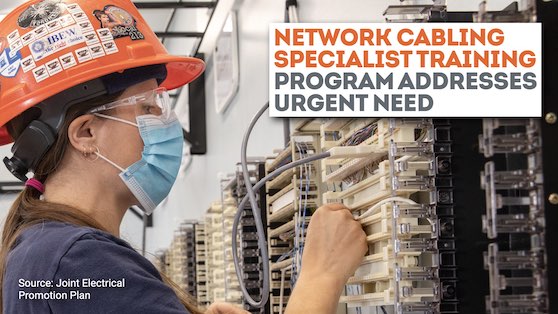
Articles
Features
Articles
Voice Data Video etc
Network Cabling Specialist training program addresses urgent need
June 24, 2022 | By Anthony Capkun
IBEW CCO and ECAO’s 631A training program

June 24, 2022 – The surge in demand for expertise in the communications sector has left electrical and communications contractors struggling to find qualified individuals (i.e. network cabling specialists [NCS]) to do the required work to build and sustain critical telecommunications infrastructure.
“The work of an NCS can best be described as installing the telecommunications highway,” says Rich Di Pietro, project manager, with the Ontario Electrical Industry Training Trust Fund (OEITTF). “And this can include everything from standard computer and phone systems, assuring cell phone operability within buildings, cable TV, and Wi-Fi service to controlling the temperature in your home or business, to Power-over-Ethernet (PoE) devices, like lighting, where there is no longer is a conventional source of power.”
In essence, the network cabling specialist’s work touches every aspect of modern life.
This work was deemed important even before the pandemic, but became even more relevant and essential as more people worked (or studied) at home during the pandemic, and the need for a telecom infrastructure that could provide reliable connectivity became critical.
The Electrical Contractors Association of Ontario (ECAO) and the IBEW Construction Council of Ontario (IBEW CCO) stepped up to help guide the government on the right approach to meeting those needs.
“The government listened and responded with Skills Development Funding to support a certification program that professionalizes the [NCS] trade to ensure this important work is done correctly and safely,” said James Barry, executive secretary treasurer, IBEW CCO.
“The collaborative approach of the ECAO and IBEW CCO allowed for a non-partisan, industry perspective on what was needed,” said Graeme Aitken, executive director, ECAO. “Together, we have demonstrated the immeasurable value in setting shared goals that bolster the professionalism and integrity of the trade.”
Aitken noted this certification program will provide significant value for contractor members who will have the trained workers needed to address the growing demands in the communications sector.
The 631A Network Cabling Specialist trade designation is not new; however, what is new is IBEW CCO’s Training Delivery Agency (TDA) status as a designated provider for the NCS apprenticeship program in the Province of Ontario, with which they aim to significantly advance this important skilled trade.
Getting to know the NCS
The network cabling specialist is the fastest-evolving occupation in the electrical family of trades, notes Di Pietro. “Information, Communications and Automation Technology (ICAT) is rapidly changing which, in turn, increases the demand for communications services—specifically in the NCS occupation.”
He points to the expansion of PoE cabling, which is now becoming the normal specification in the design and building of communication systems. This encompasses sources of power and the communications data link for a variety of systems, including Wi-Fi base stations, certain security systems, lighting systems, building automation operating systems and devices, as well as communications and technology systems.
Naturally, this evolution in technology has increased the need for employers to increase the number of NCS technicians and apprentices, along with upskilling their current workforce; meaning, workers who are already certified electricians but lack the crossover training to be certified as 631A Network Cabling Specialists.
IBEW CCO will train and mentor a contractor’s current workforce to ensure completion of the 631A licence, leading to a workforce with the required skill set for projects of any size. Each worker is also trained in areas such as Working at Heights and WHMIS. Di Pietro also feels IBEW CCO training will prove cost-competitive, as alternative training delivery methods are usually “private and expensive”.
This is something of which Di Pietro is very proud: “Now, NCS apprentices and future apprentices will have access to course offerings, access to learning accommodations, and state-of-the-art training in regions of the province”.
He explains that, to date, access to this kind of training for apprentices has been extremely limited—to the point where they cannot or do not attend. Currently, the IBEW CCO’s offerings are across Ontario, including Thunder Bay, Hamilton, Toronto, Ottawa, Sudbury, and Kitchener, giving NCS apprentices the ability to attend the training closer to home.
The importance of certification
Whether it’s an electrician or network cabling specialist, IBEW and its ECAO partner contractors have always stressed the importance of high training standards within the industry, says Di Pietro, adding “It is not only critical for promoting safety in the workplace, but ensures the work is done correctly the first time”.
Although network cabling specialist tasks are considered “low-voltage” work—hence reduced risk—Di Pietro insists they nonetheless involve important skills that require the right training. “With higher voltages and wattages currently being tested for PoE, we may see higher risk in the future, which will certainly require additional training.”
He says the partners are also aggressively marketing these training programs to not only draw more 631A apprentices into the workforce, but to also upskill those already working within the communications and low-voltage sector.
“It is imperative to ensure we have the skilled workforce necessary, not just for today, but for the future,” Di Pietro counsels, “and that includes having a balance of apprentices and experienced journeypersons.”
IBEW CCO has had contractors in the non-union sector contact them to learn more about 631A training, Di Pietro adds. “They realize that properly trained employees—who have been through formal apprenticeship and received certification—will help the contractor remain competitive.”
Any contractor interested in learning more is encouraged to visit ibewcomms.ca and contact IBEW CCO to discuss individual needs, as well as expanded work opportunities as an ECAO signatory contractor.
Those who are interested in pursuing a 631A licence should also visit ibewcomms.ca to learn more about the trade and available opportunities.
“There is a host of information to help them learn more about the trade and how to apply,” says Di Pietro, adding that experienced communications technicians are also encouraged to learn more about the benefits of upskilling. “We have recruiters throughout the province ready to guide you through the process”.
Because technology never stops advancing, it is important workers remain knowledgeable in current practices. In the NCS sector, proper training and licencing also reduces deficiencies and adds to employer credibility.
“This trade certification program allows workers in the trade to have a fulfilling career and feel justifiably proud of what they have achieved and what they do,” says Di Pietro.
You’ll find all our Back Issues in the Digital Archive.
Print this page
